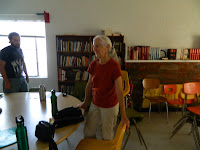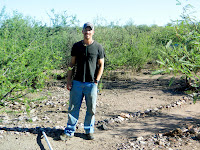July 12
We came back into the city today, and in the early afternoon went to the Justice Building to observe a phenomenon I have never seen in Canada and never want to see it either there, or anywhere else in my life.
It is called Operation Streamline. It was a program started in 2005, to criminalize migrants for crossing illegally into the United States. Before that time, most migrants who were caught would be detained, made to sign voluntary deportation orders, and deported. Sure, during arrest, detention and transport they would often be subjected to humiliations, beatings, deprival of water and other indignities but in spite of being treated like criminals, most were not legally recognized as such. That all changed 6 years ago.
In 2005, the Border Patrol began taking migrants to court, and demanded that everyone who was picked up would be given a criminal record and maybe some jail time as well. The courts replied that such an action was impossible. A deal had to be made. BP began to randomly select approximately 30 to 70 migrants from the hundreds who are detained each day, and dragging them off to court.
The process happens Monday through Friday every week, and is open to the public. The defendants are charged with illegal entry if this is their first time entering, and illegal re-entry if it is their second time. There are about 5 to 6 lawyers, so each one takes on between 5 and 14 clients, depending on the number. Each group has about 30 minutes with their lawyer, in total. They are presented with prepared plea bargains that the lawyers and prosecuting attorney earlier prepared, stating that they are guilty of the above mentioned offence (1st timers are committing a misdemeanour, second timers a felony) and outlining the punishment. First timers are given a criminal record and deported. Some have spent days or weeks in jail before their day in court, and that is considered time served. Second timers are sentenced to prison for a period of a week to 6 months, after which they will be deported. People who do not sign are given a federal trial and charged with the same offences. Difference is that is they are found guilty they will spend 2 years in prison. An overwhelming majority do not.
They filed in to face the judge. That Monday there were 31 of them. We sat in the courtroom and watched the events unfold.
The judge is sitting in his chair, above him is a large circular emblem: US District Court, District of Arizona. The lawyers are there already, as are three BP agents in sharp green uniforms and a court officer. The migrants are standing in 3 groups.
Before you can see them, you can hear them. Their chains, that is. Everyone is handcuffed, leg cuffed, and has a chain around his waist. Most are Mexican, although some are from Guatemala. They are all young men this time, at other times there are women among them. They are all very dark skinned (Lois tells us most migrants she works with are campesinos- farmers- from Southern Mexico who were forced to leave because of NAFTA) and wearing clothes that reveal being worn for a very long time. Their faces are emotionless, devoid of any expression. Most do not speak English, and all are wearing translator earsets.
The trial starts. The judge is a kindly man with a moustache, and does not look angry at the migrants. His name if Thomas Ferraro. He gently tells them about the charges they are facing, and allows them to ask questions they may have. He tells them they are being charged with illegal entry, that what they have done is punishable with up to 6 months in jail or a $5000 fine. Each of them have the right to enter a guilty or non-guilty plea. They have the right to a retrial if they plead not guilty, it will occur before a US Magistrate and the prosecutor will have to prove they are guilty. He asks if they have any questions. Everyone collectively says no.
6 people are called up and appear with their lawyers beside them. They are asked if they understand the sentence. They all say “si”.
“Do you still want to plead guilty”
“Si”
“Do you understand your rights”
“Si”
“Do you understand if you plead guilty you will lose your rights?”
“Si”
“Do you give up the right to waive or appeal the sentence”
“Si”
“Do you have any questions?”
“No”
“How do you plead?”
“Culpable” (guilty).
Nationality is quickly ascertained.
“Mr. Alejandro Rodriguez*, are you a citizen of Guatemala?”
“Si”
“Are the rest of you citizens of Mexico?”
“Si” (everyone else responds)
Then each defendant is asked a series of questions. They go something like this:
“Mr. Alejandro Rodriguez*, did you enter the United States on July 11, 2011 near Sasabe?”
“Si”
“Did anyone threaten you to make this statement?”
“No”
A few other questions are asked of him and everyone else facing the judge, including if the defendant wants to plead guilty. Everyone says yes. It is quite chilling. The Court is asked if they are satisfied. The answer is yes. The migrants are asked if they want to add anything. Everyone says no.
There is one exception. One man chooses to plead not guilty. He will go to another court. Lois expresses surprise later, this kind of thing she says happens very rarely.
The first timers are given a criminal record and released with time served before deportation. Some thank the judge. “gracias, gracias” can be heard in the courtroom. Three of them were indigenous Mexicans and Guatemalans and cannot speak either Spanish or English. They are not charged with anything and simply marched out and deported, not having probably understood a word of what just took place.
But others are not so fortunate. The sentences are handed down. People get sentenced from 9 days to 125 days in jail. Young men who risked their lives to support their loved ones and try to survive the severe economic hardships imposed on their communities are now going to be locked up in penitentiaries, doing prison labour and being in a violent and dangerous environment where gangs like the MaraSalvaTrucha 13 often exert a strong influence and in essence force many inmates to either join or be severely harmed; where they will be in the company of murderers, rapists, drug dealers and others who have a habit of preying on the weak, and the newcomers who arrive on a daily basis are more than fair game. It is tragic and some of us want to start crying, myself included. Some of the newly sentenced prisoners keep their eyes to the ground, not wanting to look up. Others are trying to put on a brave face, to somehow not betray the fear and apprehension of what lies in store. They are escorted out by the BP, dressed ever so sharply and professionally in their slick green uniforms.
After sentencing each small group, Ferraro tells them “Good luck to you all, I hope you have no more trouble”.
*Not a real name, but an alias I made up
**They are actually magistrates and have not yet reached that rank, but preside in that role for O.S.


















































